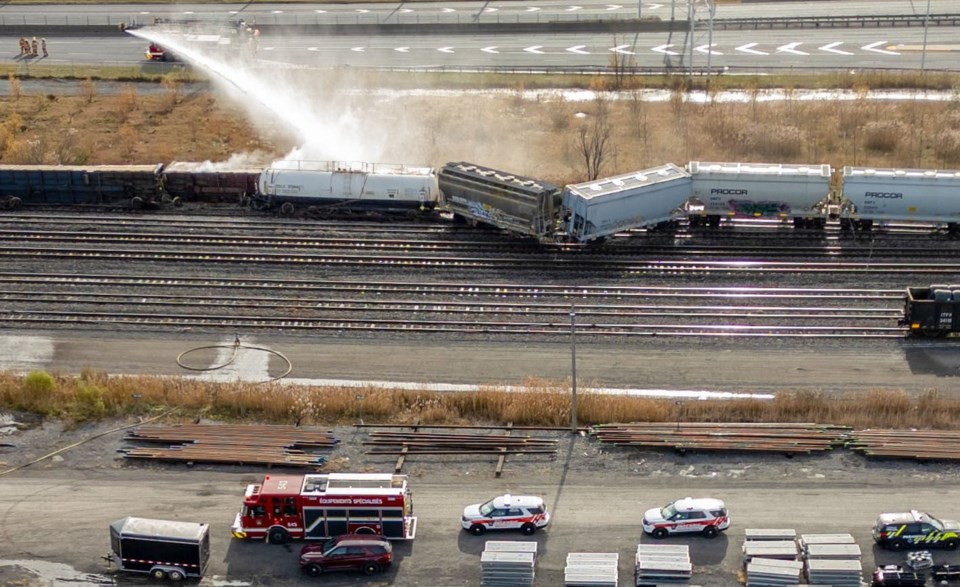LONGUEUIL, Que. — People in a part of Longueuil, Que., were being asked to stay indoors with their doors and windows closed on Thursday after a train derailed in the morning, spilling an unknown quantity of hydrogen peroxide.
Longueuil Mayor Catherine Fournier told reporters just before 3 p.m. that the situation was "under control" but that the confinement order remained in place, and that both rail traffic and vehicle traffic on nearby Highway 116 remained shut down.
The city announced at 4:30 p.m. that it was reducing the size of the confinement perimeter after testing by public health indicated it was safe to do so.
Earlier, police from the city just east of Montreal said it didn't appear anyone had been hurt, although a CN rail official told a news conference that three employees had been taken to hospital as a precautionary measure.
The derailment happened at around 9 a.m. in the city's LeMoyne area, near the intersection of St-Louis and St-Georges streets. Mathieu Gaudreault, a spokesman for CN rail, said about eight cars derailed at the Southwark rail facility, including four that toppled over.
"As of this morning, the information we have is it's hydrogen peroxide that was in the rail car and created the fumes we saw," he said, adding that there was no risk of fire.
François Boucher, a spokesman for the Longueuil police department, said police were asking people within 800 metres of the site to stay indoors while experts ensure the air is safe to breathe.
"It is as a preventive measure that we encourage people to really avoid exposing themselves unnecessarily," he told reporters near the scene. In addition to closing doors and windows, people in the area covered by the notice are asked to close heating, ventilation and air exchange systems, and to stay as far away from windows as possible.
Police and fire officials were on site, as well as CN railworkers, and a large security perimeter was erected.
Gaudreault said it wasn't yet clear what caused the derailment. The possibilities include a problem with the track, a problem with a manoeuvre, or a mechanical issue, he said.
Michel Alsayegh, president of Quebec's order of chemists, said hydrogen peroxide is commonly used at lower concentrations in the household to clean and disinfect wounds. A more concentrated version can be used in industry, including pulp and paper manufacturing.
Alsayegh said the substance that spilled was likely at a higher concentration, which explained why workers were spraying it with water to dilute it. He said it can create fumes that can be potentially dangerous, but it isn't explosive.
"It’s a chemical that has the potential to be dangerous, but not something that’s going to be considered very or too dangerous,” he said.
Gaudreault said CN was beginning operations to remove the derailed cars from the tracks, which are also used by commuter and passenger trains. He said the operation could take several hours or longer, depending on the complexity of the operation and damage that is uncovered.
This report by The Canadian Press was first published Nov. 14, 2024.
The Canadian Press



